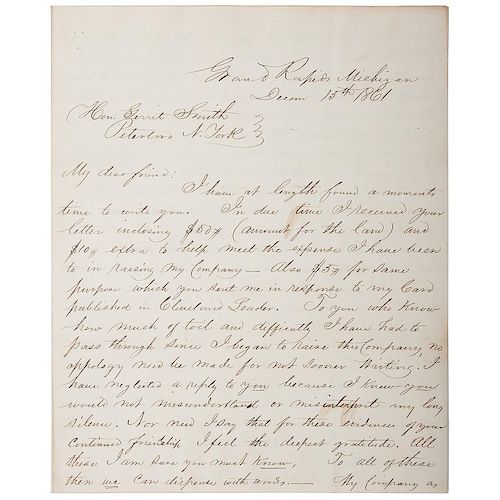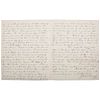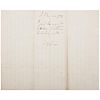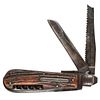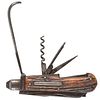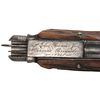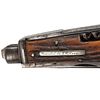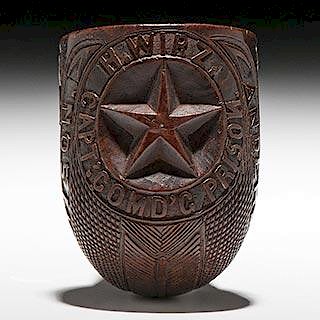John Brown, Jr., 1861 ALS to Social Reformer Gerrit Smith, Plus Presentation Knife
About Seller
6270 Este Ave.
Cincinnati , OH 45232
United States
With offices in Cincinnati, Cleveland and Denver, Cowan’s holds over 40 auctions each year, with annual sales exceeding $16M. We reach buyers around the globe, and take pride in our reputation for integrity, customer service and great results. A full-service house, Cowan’s Auctions specializes in Am...Read more
Two ways to bid:
- Leave a max absentee bid and the platform will bid on your behalf up to your maximum bid during the live auction.
- Bid live during the auction and your bids will be submitted real-time to the auctioneer.
Bid Increments
| Price | Bid Increment |
|---|---|
| $0 | $25 |
| $500 | $50 |
| $1,000 | $100 |
| $2,000 | $250 |
| $5,000 | $500 |
| $10,000 | $1,000 |
| $20,000 | $2,500 |
| $50,000 | $5,000 |
| $100,000 | $10,000 |
About Auction
Feb 21, 2017 - Feb 22, 2017
Cowan's Auctions dawnie@cowans.com
- Lot Description
Lot of 2. Brown, John, Jr. (1821-1895). Eldest son of abolitionist John Brown. ALS, 3 pp, "Grand Rapids, Michigan." December 15, 1861. Addressed to Gerrit Smith, social reformer, abolitionist, and New York Representative (1853-1857). He writes:
To you who know how much of toil and difficulty I have had to pass through since I began to raise this company, no apology need be made for not sooner writing...My company as you are 'ere this probably informed(?) constitutes a part of Col. Jennisons Regiment of the Kansas Brigade...The Proclamations of different State Governors forbidding the enlisting of citizens into Regiments not raised in the States to which they belong has been a great difficulty for me to surmount. But, greatest of all is the fact that none but anti-slavery men, and these too of the fighting class of anti-slavery men, would enlist with me. The proportion of these to the whole class of anti slavery men is small indeed--The greater portion are the talking sort, who now in the present "impending crisis" finding their "occupations gone" instinctively take themselves to managers and growl...In spite of all of these, there has been much to encourage--I have a Company of men worthy, "to stand before the Kings and not before the mean men,"-- a Company worth more than a Regiment of ordinary men in doing the work of this war.
Accompanied by a Farrier's folding knife, 4.5 in. folded, 7.5 in. opened, presented to John Brown, Jr. by J.W. Loomis in 1861. Almost every cavalryman carried a similar knife during the Civil War. It was a useful tool with specific folding blades for cavalry gear and a special blade for removing stones along with other objects caught in horseshoes. On reverse is a very large folding stone hook blade, smaller corkscrew, and pick devices; two small removable tools are inset at the top of the handle. The blades bear markings of L. P. Rhoades / Celebrated. Engraved on the stone hook, on its wide flat surface, is a professional inscription in three lines, Capt. John Brown, Jr. / 1st Kansas Brigade / 1861. On the small matching iron escutcheon plate on the center of the obverse stag grip, an engraving, in the same style as the other, reads, presented by G/J.(?) W. Loomis. The maiden name of John Brown's great-great grandmother was Loomis. The knife was most likely given to John Brown, Jr. by a distant relative, possibly his fourth cousin one time removed George "Wash" Loomis, leader of the Loomis gang, or by the cigar manufacturer J.W. Loomis. However, the source of the knife cannot be confirmed.
As John Brown, Jr. explained in his letter to Gerrit Smith, male abolitionists were typically pacifists who preferred using words over real weapons. His father, John Brown, on the other hand, was a man of action who was not opposed to violence. Dedicated to the abolition of slavery, John Brown helped finance the publication of David Walker's Appeal and Henry Highland's "Call to Rebellion" speech, gave land to fugitive slaves, and raised a black child as his own. He participated in the Underground Railroad and helped establish the League of Gileadites, an organization that protected escaped slaves from slave catchers. After meeting Brown, Frederick Douglass described him as "in sympathy a black man," who was so moved by the cause that it seemed "his own soul had been pierced with the iron of slavery" (http://www.pbs.org/wgbh/aia/part4/4p1550.html). For a time, Brown lived in a black community in New York on property donated by Gerrit Smith. There, he and his family developed a long friendship with Smith. After following his sons to Kansas, Brown assembled a group of antislavery guerillas who attacked the town of Lawrence. John Brown, Jr. fought alongside his father throughout the 1850s, but did not join him at Harper's Ferry. Even though he was not directly involved, local officials arrested and imprisoned him for his father's crimes. Gerrit Smith financially supported Brown as a member of the "secret six," which implicated him in the raid. John Brown, Jr. was released and Smith was pardoned after Brown hanged.
At the outbreak of the Civil War, John Brown, Jr. began recruiting a company of soldiers that would travel to Kansas and enlist with Kansas volunteers, but only 66 men joined him. His association with his father made many Union officers balk and hesitate to grant him a commission. He finally obtained one as captain in the Kansas 7th Volunteer Cavalry, Co. D. His brother, Salmon, had similar issues and was stripped of a position promised to him by Colonel John Fairman of New York. John Brown, Jr.'s term of service was cut short when complications with rheumatoid arthritis forced him to resign. Following his resignation, he purchased ten acres on the south shore of South Bass Island at Put-in-Bay, OH, where he remained until his death in 1895.
Provenance: N. Flayderman and Co., Inc.Typical folds of the letter and minor toning on the outer margins. As for the knife, the pen knife blade broken is broken and there are white paint markings with the number 7604 on the reverse.Condition
- Shipping Info
-
SHIPPING. At the request of the buyer, Cowan's will authorize the shipment of purchased items. Shipments usually occur within two weeks after payment has been received. Shipment is generally made via UPS Ground service. Unless buyer gives special instructions, the shipping method shall be at the sole discretion of Cowan's Auctions, Inc.. Cowan's is in no way responsible for the acts or omissions of independent handlers, packers or shippers of purchased items or for any loss, damage or delay from the packing or shipping of any property.
-
- Buyer's Premium



 EUR
EUR CAD
CAD AUD
AUD GBP
GBP MXN
MXN HKD
HKD CNY
CNY MYR
MYR SEK
SEK SGD
SGD CHF
CHF THB
THB